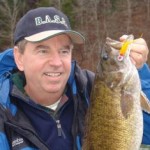Robert Montgomery, widely-recognized as one of the nation’s top fishing writers, voices the growing concern with anti-fishing attitudes that seem to be spreading in some parts of the country.
Written by Robert Montgomery
from The Fishing Wire
At the bank the other day, the teller told me that I had shortchanged myself a thousand dollars on my deposit slip.
I know why it happened. Each of the checks that I was depositing included a fraction of a dollar. I was so concerned about getting the pennies correct that I neglected to devote sufficient attention to the dollars.
In other words, I focused too much on minor details and completely missed the big picture.
That’s an easy thing to do. Most of us have done it at one time or another, and, fortunately, consequences usually aren’t catastrophic. We have spouses, friends, and friendly tellers to set us straight.
But too many of us are missing the big picture right now regarding the future of recreational fishing, and consequences could be catastrophic.
As the administration leads the country in a direction that the majority of Americans oppose, those who dislike recreational fishing or, at best, are indifferent to it, are using their White House alliances to push for massive federal control of public waters. And here’s the dangerous part:
As conservationists, anglers believe in sustainable use of fisheries, while protecting habitat, opposing pollution, and preserving the resource for future generations to enjoy.
By contrast those pushing an anti-fishing agenda are preservationists who believe in “look but don’t touch.” They assert that humans exist apart from nature, rather than as a part of it. They think that we act immorally when we manage or alter it in any way.
Montgomery says angling opportunities are under fire in many parts of the nation due to mistaken or misdirected efforts at environmental sustainability.
Consequently, the big picture is that a concerted effort is underway to deny us access to a public resource, and, in so doing, to deny and destroy a significant portion of our history, culture, and economy — not to mention our right to enjoy a day on the water with friends and family.
Granted, the movement is only now gaining momentum. Chances are, if you live inland, you might not see any closures in your life time. But the snowball has begun to roll downhill.
Arguably, it began when environmentalists convinced President George W. Bush to designate two remote areas in the Pacific as marine reserves. It has strengthened with the recently created National Ocean Council, which has been given authority to zone uses of our oceans, coastal waters, and Great Lakes, as well as the option to move inland to rivers, lakes, and reservoirs.
Also, it’s taking shape via the Magnuson-Stevens Conservation Act and a “catch shares” management strategy in which recreational participation would be capped.
And as preservationists seek to “protect” oceans from anglers, lake associations want to do the same on inland waters. Knowing a good excuse when they see one, they insist that closures of public access areas are needed to prevent spread of invasive species.
Inland access might seem unrelated to the ocean management. But they are two fronts of the same battle.
You need only look to California to see what is coming our way. Fisheries are falling one after the other, like dominoes, as emotion trumps science-based fisheries management.
Mostly the closures are coming under the auspices of the state Marine Life Protection Act (MLPA). But they’re also occurring through local regulations. Four out of five members of the Laguna Beach City Council supported a five-year moratorium on recreational fishing along its 7 miles of coast.
“There’s no such thing as a five-year moratorium,” said dissenter Kelly Boyd. “You turn something over to the state and you’ll never get it back.”
Dave Connell, an angry angler, added, “We’re fighting a fad, an environmental extremist wacko fad about closing the ocean. I do not know what their agenda is, but it is not to save the fish. It is not to keep the ocean clean.”
For our side, the fishing industry is spearheading a Keep America Fishing campaign (http://keepamericafishing.org). In particular, member Shimano deserves recognition. Along with donating $100,000 a year and considerable staff time annually to the cause, it has been one of the most outspoken critics of the way in which the MLPA has been implemented.
As a consequence, it has been the target of the Natural Resources Defense Council and other environmental groups, who have deep pockets with which to voice their zealotry. Filled with invective and inaccuracy, the Shame on Shimano website (www.shameonshimano.com) is but one example.
“The ‘Shame on Shimano’ campaign by NRDC is an outrageous misrepresentation of the facts about a company who has led the outdoor industry in supporting scientific research, habitat improvement, youth programs and fishery conservation efforts across North America for twenty years,” said Jeff Crane, president of the Congressional Sportsmen’s Foundation (CSF).
Starting to see the big picture yet?
Robert Montgomery is the author of Why We Fish, a collection of essays exploring the many reasons that we go fishing. Bill Dance also contributed to the book, as did nine others. It is available from Amazon ($12.03) and other booksellers, as well as from the publisher, NorLights Press ($15.95).

Doubt one or two people would hurt it.Think of how many anmlais are in / near lakes regularly.How about a moose? A beaver or muskrat…not to mention turtles and fish..Add to the list as you please, I would bet they all Pee.